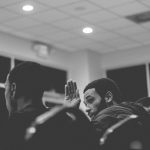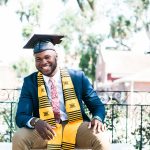Father Maurice J Nutt “Rally For Peace in Chicago”
by Father Maurice J Nutt, C.Ss.R.
Between 2011-2014 Father Maurice J Nutt, C.Ss.R. lived in the city of Chicago. Chicago is one of his favorite cities because of its cultural and religious diversity, its museums and many engaging activities throughout the year. Father Maurice thoroughly enjoyed my years of being a citizen of the “Windy City.” While living in Chicago, he was very active in my Black Greek Fraternity, Alpha Phi Alpha Fraternity, Inc. One of the less attractive things about living in Chicago especially during those years was that his beloved city was plagued by street violence. The following are the words that Father Maurice offered with regards to a “Rally for peace in Chicago”…
“Peace on our Chicago Streets”
 We have an epidemic of violence in this country and in our city, and guns play a big part. It is not acceptable, and something needs to be done about it. I know the arguments against gun control – cities with strict gun laws actually have more crime, and anyway, the Second Amendment of the US Constitution gives us the “right to bear arms.” But again, what good are those arguments doing to move us toward a more peaceful city, country or even world?
We have an epidemic of violence in this country and in our city, and guns play a big part. It is not acceptable, and something needs to be done about it. I know the arguments against gun control – cities with strict gun laws actually have more crime, and anyway, the Second Amendment of the US Constitution gives us the “right to bear arms.” But again, what good are those arguments doing to move us toward a more peaceful city, country or even world?
Surely we can do better than what we recently witnessed in Congress, when a minority of Senators voted down two bipartisan bills that would have expanded background checks on firearm sales and banned some semiautomatic firearms modeled after military assault weapons. Can someone please tell me why the average person in the community where you or I live – or any US community for that matter – would need a semiautomatic firearm modeled after a military assault weapon?
 We need to do something besides drawing our lines in the proverbial political sand and daring other people to cross it. Tell, me Congress, what is so hard about working together to find a solution? Are you afraid of not getting reelected? Will you lose donations to your political campaigns? Are you determined not to budge because someone outside your party proposed something? Tell me, are any of those more important than the life of Hydiya Pendleton, Trayvon Martin, Jordan Davis, the teenagers at Columbine High School, the movie-goers in Aurora, the children and teachers in Newtown or the myriad of other lives struck down almost every single day on the streets of the Southside and Westside of Chicago by gun violence? Your inability to work together to find a solution certainly sends that message.
We need to do something besides drawing our lines in the proverbial political sand and daring other people to cross it. Tell, me Congress, what is so hard about working together to find a solution? Are you afraid of not getting reelected? Will you lose donations to your political campaigns? Are you determined not to budge because someone outside your party proposed something? Tell me, are any of those more important than the life of Hydiya Pendleton, Trayvon Martin, Jordan Davis, the teenagers at Columbine High School, the movie-goers in Aurora, the children and teachers in Newtown or the myriad of other lives struck down almost every single day on the streets of the Southside and Westside of Chicago by gun violence? Your inability to work together to find a solution certainly sends that message.
Yes, I’m also aware that guns are but one piece of a much bigger puzzle we have to figure out. The violence that is rampant in our society is indicative of numerous issues that plaques our communities; such as mental health issues, poverty, unemployment, ineffective educational systems, lack of parental care or un-raised children, street gangs that are out of control, the inability to peaceful resolve conflicts among rival gangs and among members of the same gang, lack of mentoring initiatives and just a pervasive sense of hopelessness.
 I’m sure we’ve all heard the phrase “Guns don’t kill people, people kill people!” Help me Jesus! Technically, that is true. But when those guns get in the hands of people with mental health issues, people who feel hopeless, people who do not value themselves let alone another human life, or people who are numbed to violence for a vast number of reasons – our media included – we have a society that is simply out of control!
I’m sure we’ve all heard the phrase “Guns don’t kill people, people kill people!” Help me Jesus! Technically, that is true. But when those guns get in the hands of people with mental health issues, people who feel hopeless, people who do not value themselves let alone another human life, or people who are numbed to violence for a vast number of reasons – our media included – we have a society that is simply out of control!
We all know that violence in Chicago has been the subject of national discourse for over a year. The number of homicides in the city in 2012, 508, stunned people across the nation. How could so much tragedy take place in a world-class city? In the home of a sitting president?
Despite the national headlines the increased interest due to the Obama connection and the relatively new 24-hour news cycle, 2012 was NOT a record year for murders in Chicago. The final count of 508 homicides is a marked increase from 2011, which saw 435 killings. But did you know that there were 513 murders in 2008? 601 murders in 2003? What about the 704 people killed in 1998? How about the 931 victims in 1994? The city’s all-time high of 970 killings was in 1974.
I cite those figures not to dismiss the significance of the recent spike in murders, but to make it clear that those of us who live in Chicago know this violence all too well. It is tragic, heartbreaking, maddening—but not at all new.
 Black death and Black pain are far too familiar to the city of Chicago, a city that should NOT be viewed through the lens of tragedy. A city founded by a Black, Catholic man, Jean Baptiste Point du Sable. A city that has cultivated Black icons and Black excellence, from Lou Rawls to Derrick Rose, Gwendolyn Brooks to Jennifer Hudson. From Harold Washington to Common, Lorraine Hansberry to Michelle Obama. Chairman Fred Hampton, Nat King Cole and the list goes on…
Black death and Black pain are far too familiar to the city of Chicago, a city that should NOT be viewed through the lens of tragedy. A city founded by a Black, Catholic man, Jean Baptiste Point du Sable. A city that has cultivated Black icons and Black excellence, from Lou Rawls to Derrick Rose, Gwendolyn Brooks to Jennifer Hudson. From Harold Washington to Common, Lorraine Hansberry to Michelle Obama. Chairman Fred Hampton, Nat King Cole and the list goes on…
In fact, it was in Chicago where a young Arkansas transplant by the name of John H. Johnson, an Alpha man became one of the most successful Black men in history with the founding of the Johnson Publishing Company. Chicago is also the adopted home of a North Carolina transplant, Rev. Jesse L. Jackson, an Omega man who continues to advocate for justice nationally and internationally. Chicago is my home and your home and for far too long, our home has been in peril.
Fairly recently, a six-month-old baby died as a result of gunshot wounds she sustained when an unknown shooter fired into the car where her father was changing her diaper. What kind of world do we live in where even the youngest of lives are not safe from this sort of attack?
Gun control advocates point to Chicago as evidence that stricter laws are needed to keep guns off the street. Gun rights activists counter that the state of Illinois has very tight possession laws and that most of the firearms used in these crimes have been obtained illegally. Some folks blame the tragedies in Chicago on fatherlessness, while other cite poverty as the greatest catalyst. In reality, this is not a 140-character problem. There are many causes for these tragedies and many challenges facing our people in Chicago. And without understanding them, solutions will remain elusive.
 “Know thyself”— two words that can be as simple or complex as we make them. The process of self-discovery is one fraught with benefit and consequences; nonetheless, it is a journey that all must undergo. While we spend a great deal of time telling our young people what to do and socializing them into what to consume, we often miss the chances to help them discover themselves and help them figure out what their role on the planet is, not just what they can make money doing.
“Know thyself”— two words that can be as simple or complex as we make them. The process of self-discovery is one fraught with benefit and consequences; nonetheless, it is a journey that all must undergo. While we spend a great deal of time telling our young people what to do and socializing them into what to consume, we often miss the chances to help them discover themselves and help them figure out what their role on the planet is, not just what they can make money doing.
Chief Keef, entrenched in a heavy gang culture, is a prime example. To him, Chicago’s Black Disciples is central to who he is and who he should be. Each of his tweets carries #300, a reference to the gang, and he’s been known to only state his age as “300.” A gang, for many, meets a craving for community; however, as this bleeds into an all-consuming sense of identity, the consequences can be large. Gangs are not likely to leave today or tomorrow. Chicago is no stranger to gangs; in fact, they are so much a part of the city’s history that there have been numerous attempts to organize them for progressive social action and governmental intervention to destabilize political alliances.
The violence that Chicago faces is undoubtedly tied to gangs and new cliques, which are emerging each day. Their presence and influence is undeniable. What we have to think about is how we deal with them, organize around and with them, and help young people see the bigger picture of how to break out of the oppression they face. For decades, organizations like the Nation of Islam (whether you agree with their theologies or not) dedicated themselves to operating in the poorest of communities and teaching young people to think differently about their place in the world. We spend more time shaking our heads and “being concerned” than being active in engaging our young people to show them the rich legacies they come from and the even richer ones they can build together.
Without strong identity, it’s difficult to have strong communities. We’ve become quick to identify with places, but not necessarily with people. The term “hood” is not simply a linguistic shortcut; it may represent our collective move from being neighboring and valuing the interpersonal relationships with our neighbors.
In a thriving community there are strong bonds that assure people know each other and can work together for a collective good. Chicago, like many major cities, has not ostracized those who are in gangs, deal drugs, or practice other behaviors that many eschew as dangerous. Instead, people locked into poor neighborhoods often find a way to keep their heads above water, maintain some relative semblance of safety, and make it day-to-day. However, surviving is not thriving. There need to be more buoys in an ocean of hazards.
No matter how many speeches are made about progress and economic booms, the reality is that many of our youth grow up in neighborhoods that lack full access to opportunities. Whether crumbling schools or unsafe streets, finding success in the valleys of America’s inner cities remains a harrowing task. Chicago, like many metropolitan areas, has been particularly hard hit by the disappearance of work and deep levels of Black male unemployment. For young men, the inability to work paired with early fathering and low levels of education is a treacherous combination. Until there are greater opportunities opened in Chicago, Black males will remain haunted by an ever-widening prison industrial complex or worse, death.
 If we want to re-shape the lives of young brothers and sisters in Chicago, we need to work on developing greater senses of identity, purpose, community, and opportunity. This will take more than the willful engagement of youth; it will require the sturdy dedication of elders and bold movement by political officials and the grassroots. Everyone has a role to play as we try to turn around the problems that Chicago faces, we have to move away from selfishness and individualism admittedly these are “American values” they are certainly not Afri-centric values. I would advocate for the men of Alpha Phi Alpha Fraternity and Omega Psi Phi Fraternity, men of esteem, distinction and high ideas would seek to enhance our mentoring programs and outreach by everyman in our fraternities to step it up by mentoring at least one young man in our urban communities. I firmly believe that if all of our sisters and brothers in our Pan-Hellenic community, if only all of the Divine Nine Greek Fraternities and Sororities would take a young sister or brother by the hand and show them the way, we could make a remarkable difference in our communities. Don’t just show me your Greek paraphernalia or your smooth step moves; show me Greek sister or brother that you can be about the business of mentoring those who need your example or need your encouragement. Let us be about the business of leading our youth to a flourishing life rather than to an early grave.
If we want to re-shape the lives of young brothers and sisters in Chicago, we need to work on developing greater senses of identity, purpose, community, and opportunity. This will take more than the willful engagement of youth; it will require the sturdy dedication of elders and bold movement by political officials and the grassroots. Everyone has a role to play as we try to turn around the problems that Chicago faces, we have to move away from selfishness and individualism admittedly these are “American values” they are certainly not Afri-centric values. I would advocate for the men of Alpha Phi Alpha Fraternity and Omega Psi Phi Fraternity, men of esteem, distinction and high ideas would seek to enhance our mentoring programs and outreach by everyman in our fraternities to step it up by mentoring at least one young man in our urban communities. I firmly believe that if all of our sisters and brothers in our Pan-Hellenic community, if only all of the Divine Nine Greek Fraternities and Sororities would take a young sister or brother by the hand and show them the way, we could make a remarkable difference in our communities. Don’t just show me your Greek paraphernalia or your smooth step moves; show me Greek sister or brother that you can be about the business of mentoring those who need your example or need your encouragement. Let us be about the business of leading our youth to a flourishing life rather than to an early grave.
In Peace,
Father Maurice J Nutt, C.Ss.R.
Images courtesy of William Stitt.

Subscribe To Father Maurice's Newsletter
Join our mailing list to receive the latest news, inspirational blogs, and updates from Father Maurice
You have Successfully Subscribed!